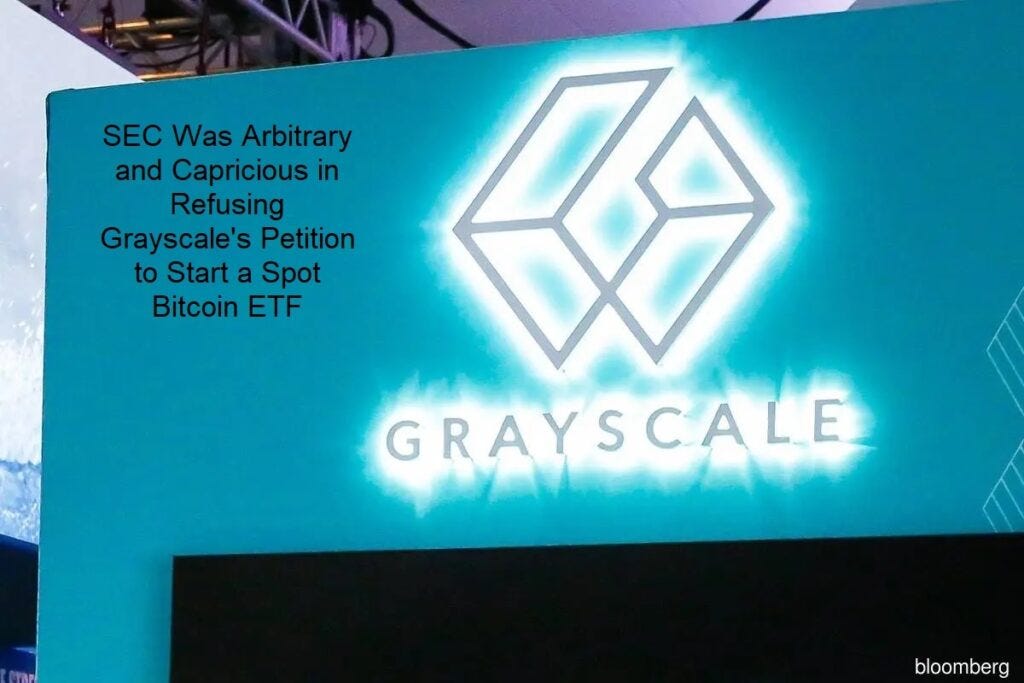Arbitrary SEC Bitcoin ETF Ruling Vacated
The Bitcoin world rejoiced when an appeals court vacated an SEC ruling that had denied the petition by Grayscale Investments LLC to launch a spot Bitcoin ETF. The burden is now on the SEC to show why it OK’d two ETFs that track Bitcoin futures while rejecting Grayscale’s bid for an ETF to track the spot price of Bitcoin. As noted by the appeals court, they do not make the rules but are empowered to overturn rulings that are, among other things, arbitrary and capricious. That is how they characterized the SEC ruling regarding Grayscale’s ETF application. Thus an arbitrary Bitcoin ETF ruling was vacated and the issue sent back to the SEC.
Discover the Doji Sandwich Chart Signal Here
What is Grayscale and What Do They Want to Do?
Grayscale investments is a ten-year-old digital currency asset management company. They launched a Bitcoin trust in 2015 which has traded over the counter. They subsequently launched similar trusts for Ethereum Classic and Zcash. In 2019 they launched the Digital Large Cap Fund (GDLC) which initially held Bitcoin, Ether, Litecoin, Ripple, and Bitcoin Cash. Grayscale currently holds about 3% of all Bitcoin. Grayscale’s GBTC is a closed end fund. Closed end funds of this type have issues with high transaction costs and valuation. The company wants to convert this business entity into an ETF that directly tracks the price of Bitcoin. Doing that would alleviate issues related to GBTC being a closed end fund.
Grayscale proposes to work with NYSE Arca, Inc. which is US electronic securities exchange that lists ETFs. As such a Grayscale spot Bitcoin ETF would trade on the NYSE Arca.
How Is a Bitcoin Futures ETF Different from a Spot Bitcoin ETF?
The basis of Grayscale’s argument was that the SEC had OK’d two Bitcoin futures ETFs. They argued that there is little material difference between the approved futures ETFs and Grayscale’s spot Bitcoin ETF proposal. As of the end of August 2023 daily trading of Bitcoin comes to about $26 billion. All of this trading requires that the trader work within the crypto realm, use a crypto wallet, guard access keys, etc. One of the attractions of trading futures on Bitcoin is that one never needs to deal with the intricacies of cryptocurrencies. All of the transactions take place in dollars on the CME exchange. Because what traders are looking for is a dollar-based way to trade Bitcoin they often choose to use one of the SEC-approved ETFs that track Bitcoin Futures.
The rationale behind a spot Bitcoin ETF is that a person could invest in or trade Bitcoin using dollars and never have to deal with crypto issues like hacked exchanges or lost access keys. And, they would not have to know anything about trading futures either! An important fact cited by Grayscale in their appeal is that there is a 99.9% positive correlation between Bitcoin prices and Bitcoin futures prices. A spot Bitcoin ETF simply eliminates the issues with futures trading entirely.
What Was SEC’s Problem With the Grayscale Spot ETF Petition?
The court ruling can be seen at assets.bwbx.io. It goes on for 21 pages. The gist is this. The SEC said that they turned down Grayscale because of concerns about how well the exchange the ETF would trade on would deal with potential market manipulation. And they said they were concerned about the fact that Grayscale holds more than 3% of all Bitcoin. This, they said, could lead to their ETF being a dominant force and distorting trading in the Bitcoin market.
What Was the Court’s Problem With the SEC?
The court’s review of the facts and ruling boiled down to this. They, the SEC, gave the OK to two Bitcoin futures ETFs. These ETFs are subject to security surveillance mechanisms of the CME and no trading manipulation has been reported. For all intents and purposes the previously OK’d Bitcoin futures ETFs and the proposed spot Bitcoin ETF would be trading the same thing, the spot price of Bitcoin as there is a 99.9% correlation between the spot and futures prices. What the court said was that the SEC had presented “insufficient reasons for treating similar situations differently.” Thus the SEC’s ruling regarding Grayscale was considered arbitrary and capricious.
Now the issue goes back to the SEC because the court will not assume the job of the SEC in deciding such an issue. But what they can do is vacate any order that does not “treat like cases alike.”
Powerful Trading Software. Simplified.
Originally published at https://profitableinvestingtips.com on September 5, 2023.
Arbitrary SEC Bitcoin ETF Ruling Vacated was originally published in BLOCK6 on Medium, where people are continuing the conversation by highlighting and responding to this story.
Disclaimer: Investing carries risk. This is not financial advice. The above content should not be regarded as an offer, recommendation, or solicitation on acquiring or disposing of any financial products, any associated discussions, comments, or posts by author or other users should not be considered as such either. It is solely for general information purpose only, which does not consider your own investment objectives, financial situations or needs. TTM assumes no responsibility or warranty for the accuracy and completeness of the information, investors should do their own research and may seek professional advice before investing.


